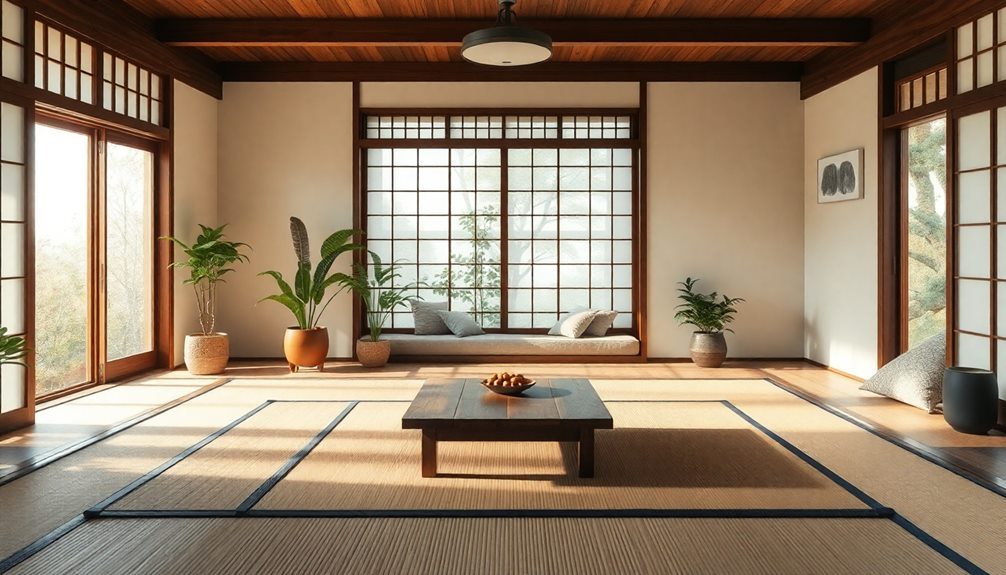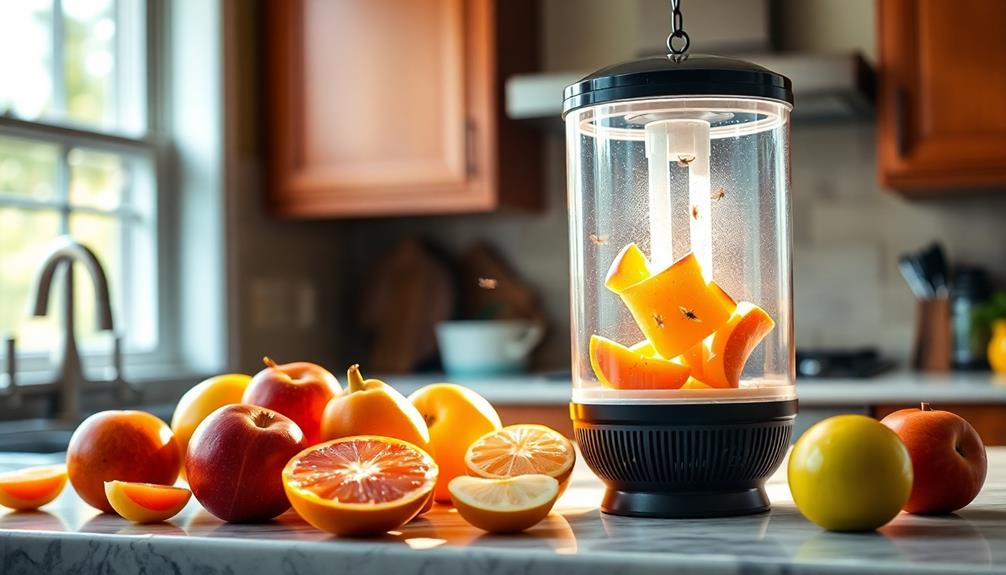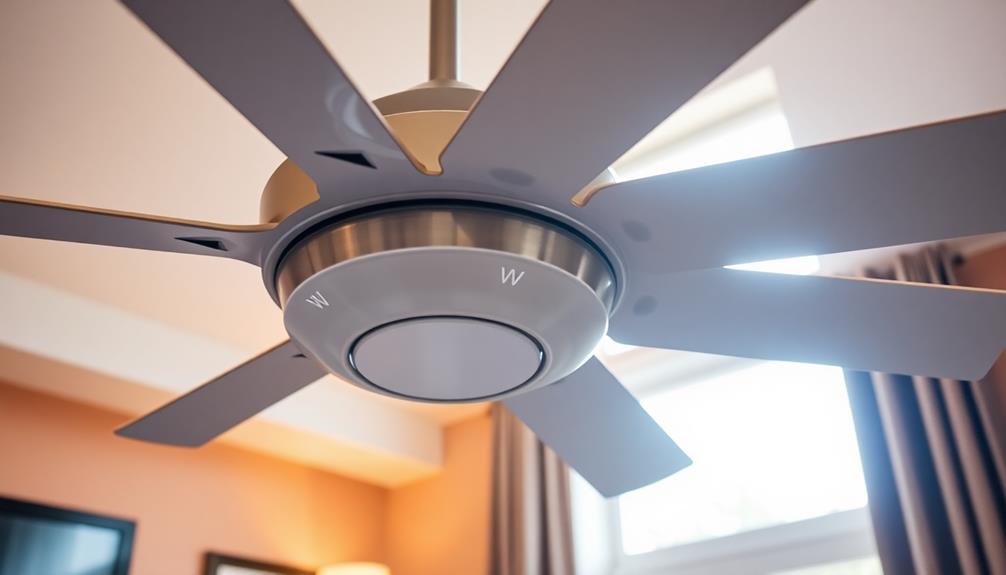When planning your vegan retreat menu, think about offering a range of delicious options. Start with hearty breakfast burritos or chia seed pudding to energize your guests. For starters, stuffed mini peppers and avocado crostini can whet their appetites. Hearty soups like creamy tomato or spicy black bean are sure to warm hearts. Colorful salads and bowls, like a Rainbow Quinoa Bowl, bring vibrancy. Don't forget flavorful mains like mushroom shepherd's pie and decadent desserts like chocolate avocado mousse to satisfy any sweet tooth. The possibilities are endless, and more exciting ideas await your exploration.
Key Takeaways
- Begin with hearty breakfast options like tofu scramble burritos and chia seed pudding for energizing starts to the day.
- Offer creative starters such as stuffed mini peppers and avocado crostini to excite guests' palates.
- Include nutrient-rich soups like Lentil Delight and Spicy Black Bean for warming, satisfying meals.
- Feature colorful salads and bowls, such as Rainbow Quinoa Bowl and Buddha Bowl, to provide vibrant and nutritious choices.
- End with decadent desserts like chocolate avocado mousse and fruit tarts to indulge guests with sweet plant-based treats.
Vegan Breakfast Delights
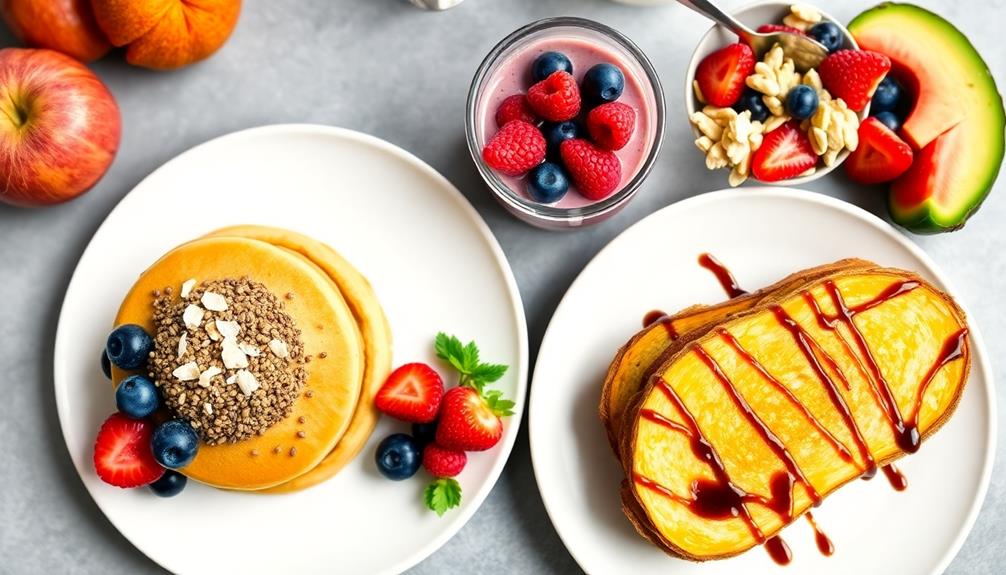
When you think of vegan breakfast delights, imagine starting your day with a vibrant array of flavors and nutrients. You can savor a hearty breakfast burrito filled with tofu scramble, black beans, creamy avocado, and zesty salsa, bringing excitement to your morning routine.
Chia seed pudding, topped with fresh fruits and crunchy nuts, offers a nutritious start that keeps you energized. Enhance your dishes with caramelized onions for savory depth or sprinkle fresh herbs for a burst of flavor.
These options aren't just delicious; they're packed with essential nutrients to fuel your day. Enjoy the variety and creativity of vegan breakfasts, ensuring every bite is both satisfying and nourishing. Your mornings can be a delightful adventure in plant-based eating!
Appetizing Vegan Starters
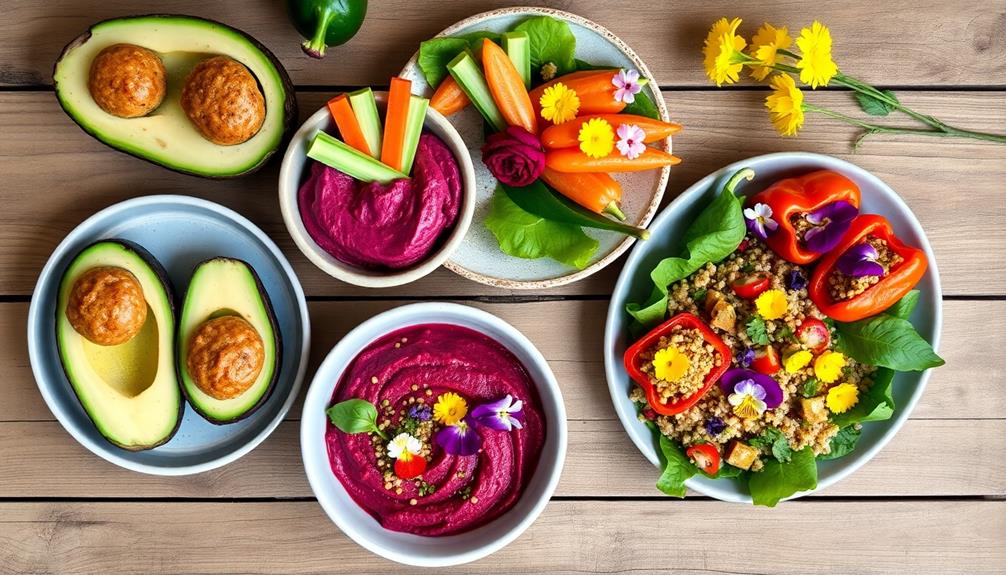
After enjoying a vibrant vegan breakfast, you'll want to keep the momentum going with appetizing vegan starters that tantalize your taste buds.
These dishes not only excite your palate but also showcase the creativity of plant-based cuisine. Here are four ideas to inspire you:
- Stuffed Mini Peppers: Roasted mini bell peppers filled with a zesty quinoa and black bean mixture.
- Avocado Crostini: Crisp toasted bread topped with smashed avocado, cherry tomatoes, and fresh basil.
- Chickpea Fritters: Crunchy fritters made from spiced chickpeas, served with a tangy tahini dipping sauce.
- Zucchini Rolls: Grilled zucchini slices wrapped around herbed cashew cheese for a revitalizing bite.
These starters are sure to impress your guests and set the stage for a delightful meal ahead!
Hearty Vegan Soups

Hearty vegan soups are a perfect way to warm your soul and nourish your body during a retreat. These nutrient-rich concoctions, packed with lentils, beans, and fresh vegetables, offer comforting flavors that you'll love. Plus, they're easily customizable to suit your preferences.
Here's a quick look at some delicious options:
| Soup Variety | Key Ingredients |
|---|---|
| Lentil Delight | Green lentils, carrots, celery |
| Creamy Tomato | Tomatoes, coconut milk, basil |
| Spicy Black Bean | Black beans, jalapeños, corn |
Colorful Salads and Bowls

Colorful salads and bowls bring a burst of life to your plate, making them not only visually appealing but also incredibly nourishing. Incorporating a variety of fresh ingredients can enhance the nutritional value, contributing to overall health and well-being, much like the recommendations for gout-friendly diets that emphasize fresh produce.
You can easily create vibrant meals that excite your taste buds and fuel your body. Here are some ideas to inspire your next creation:
- Rainbow Quinoa Bowl: Layer cooked quinoa, black beans, cherry tomatoes, corn, and avocado for a protein-packed delight.
- Mediterranean Chickpea Salad: Combine chickpeas, cucumber, red onion, parsley, and a lemon-tahini dressing for a revitalizing option.
- Asian Noodle Salad: Toss soba noodles with shredded carrots, bell peppers, edamame, and a sesame-ginger dressing.
- Buddha Bowl: Mix brown rice, roasted sweet potatoes, kale, and tahini sauce for a wholesome, filling meal.
These salads and bowls aren't just meals; they're a canvas for creativity!
Flavorful Main Courses
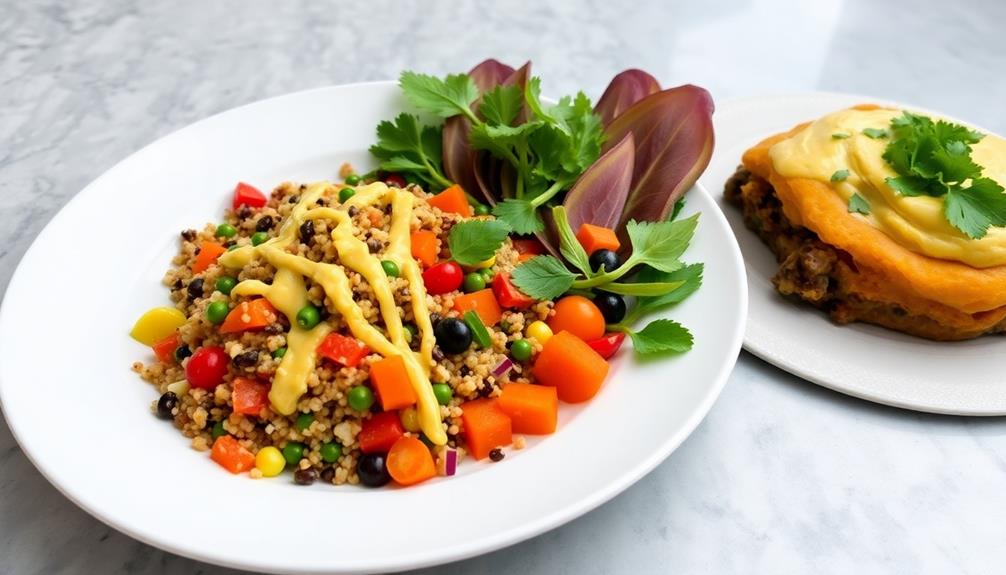
Flavorful main courses are the centerpiece of any memorable vegan retreat, offering a satisfying culmination to the vibrant salads and bowls that precede them. You'll find comforting dishes that not only taste great but also nourish your body and spirit. Here are some enticing options to inspire your menu: From hearty lentil shepherd’s pie to creamy mushroom stroganoff, these dishes prove that plant-based meals can be both indulgent and wholesome. Selecting the perfect main course can sometimes feel like a ranch versus bungalow comparison—it’s all about catering to individual preferences and creating the right ambiance. Whether you’re aiming for rustic comfort or refined elegance, the key is to craft flavors that leave a lasting impression.
| Dish | Key Ingredients | Flavor Profile |
|---|---|---|
| Mushroom Shepherd's Pie | Mushrooms, lentils, mashed potatoes | Savory and hearty |
| Smoky Lentils | Lentils, harissa, cauliflower | Spicy and smoky |
| Roasted Vegetable Quinoa Salad | Quinoa, seasonal veggies, avocado | Fresh and creamy |
| Eggplant and Cauliflower Bake | Eggplant, tomatoes, spices | Rich and comforting |
| Stuffed Bell Peppers | Quinoa, black beans, spices | Flavor-packed and filling |
These dishes will surely delight your guests and keep their energy levels high!
Savory Pasta and Noodles
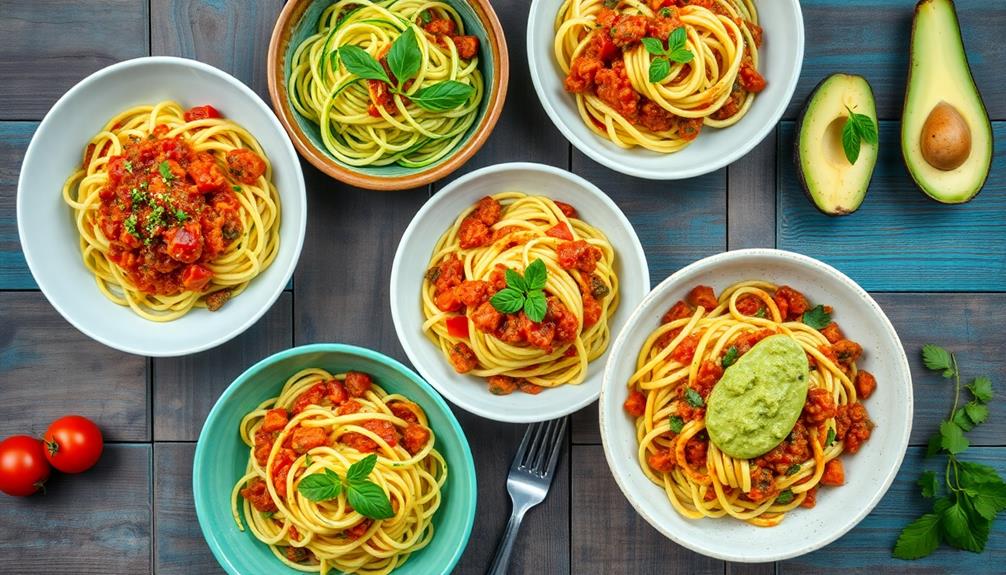
When it comes to satisfying meals, pasta and noodle dishes can truly shine at your vegan retreat.
You can create vibrant, nourishing options that cater to various tastes and dietary needs. With creative sauces and fresh ingredients, these dishes come alive.
Here are four savory ideas to contemplate:
- Zucchini Noodles with Avocado Pesto – A revitalizing twist using spiralized zucchini topped with a creamy avocado sauce.
- Lentil Bolognese – Hearty lentils simmered in rich tomato sauce served over whole grain pasta.
- Mushroom Stroganoff – A comforting dish with sautéed mushrooms in a creamy cashew sauce.
- Thai Peanut Noodles – Rice noodles tossed in a spicy peanut sauce with colorful veggies.
These meals will leave your guests satisfied and nourished!
Decadent Dessert Options
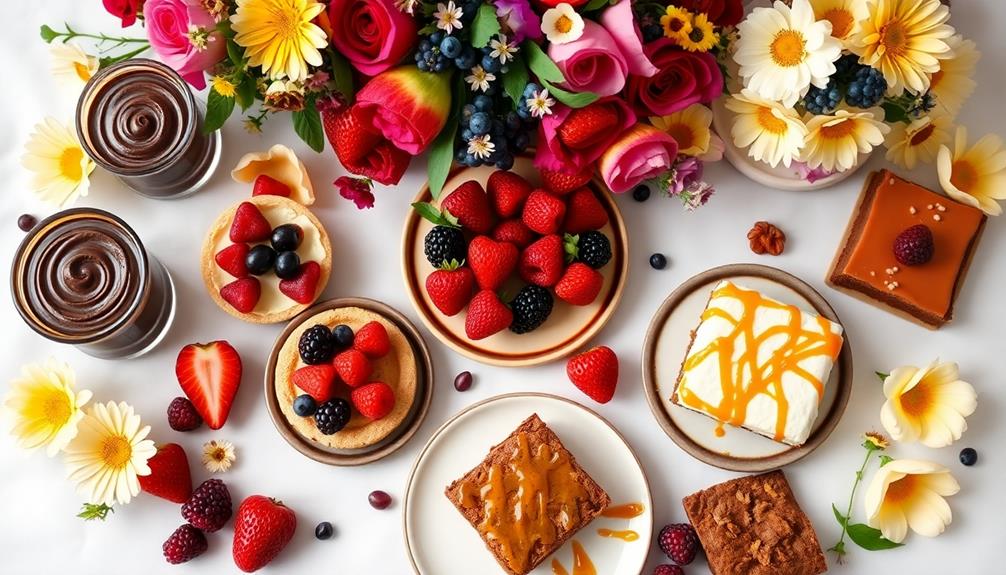
Indulging in decadent desserts is a delightful way to wrap up your vegan retreat, leaving guests with a sweet taste that lingers.
Consider serving rich chocolate avocado mousse, crafted with ripe avocados and raw cocoa for a creamy texture that satisfies chocolate cravings.
Fruit tarts filled with cashew cream and topped with fresh berries create a colorful, invigorating finish.
For a warm option, offer spiced apple crisp, featuring oats and maple syrup for a comforting touch.
Delight your guests with coconut milk panna cotta infused with vanilla, served with a berry compote.
These desserts not only please the palate but also showcase the creativity of plant-based ingredients, ensuring everyone leaves with a smile and a full heart.
Versatile Sauces and Condiments

Versatile sauces and condiments can elevate any vegan dish, adding depth and character to your meals.
They're essential for transforming simple ingredients into something extraordinary.
Here are four must-have sauces to spice up your vegan retreat menu:
- Creamy Cashew Alfredo – A rich, dairy-free sauce perfect for pasta or drizzling over roasted veggies.
- Zesty Chimichurri – A vibrant blend of parsley, garlic, and vinegar that works wonders on grilled tofu or tempeh.
- Spicy Sriracha Mayo – Combine vegan mayo with sriracha for a kick that enhances sandwiches and wraps.
- Classic Marinara – A timeless tomato sauce seasoned with herbs, ideal for pasta dishes or as a base for casseroles.
Incorporate these sauces, and watch your dishes come alive!
Frequently Asked Questions
How Can I Ensure Balanced Nutrition on a Vegan Retreat?
You can guarantee balanced nutrition on a vegan retreat by including a variety of plant-based proteins, whole grains, fruits, and vegetables. Incorporating diverse flavors and textures keeps meals exciting and satisfying for everyone involved.
What Are Some Tips for Catering to Food Allergies?
Catering to food allergies can feel like maneuvering through a minefield, but it's essential! Always ask guests about allergies, label everything clearly, and consider separate preparation areas to guarantee safety and peace of mind.
How Do I Store Leftovers From a Vegan Retreat?
To store leftovers, let them cool completely before transferring to airtight containers. Label each container with the date and contents. Refrigerate for up to four days or freeze for longer preservation. Enjoy your delicious meals later!
Can Vegan Meals Accommodate Different Dietary Preferences?
Absolutely, vegan meals can easily accommodate different dietary preferences. You can customize dishes by incorporating gluten-free grains, nut-free options, or avoiding certain allergens, ensuring everyone enjoys delicious, inclusive meals that meet their needs.
What Are Some Easy Vegan Snacks for Retreat Participants?
As you savor the peaceful retreat atmosphere, consider easy vegan snacks like energy balls, roasted chickpeas, or fruit skewers. They're nutritious, delicious, and perfect for keeping your energy up while enjoying nature's tranquility.
Conclusion
As you savor the last bite of a rich chocolate mousse, the sun sets, casting a warm glow over the vibrant table filled with colorful dishes. Each meal has been a celebration, a journey through flavors that nourished both body and soul. You leave the retreat feeling rejuvenated, inspired by the creativity of plant-based cuisine. With every delicious creation, you've discovered that indulgence and health can dance hand in hand, inviting you to savor life's moments, one bite at a time.

